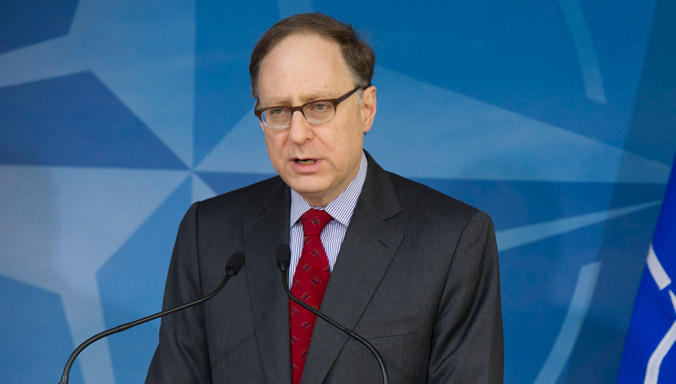
Former deputy secretary-general of NATO, Alexander Vershbow, gave an exclusive interview to Georgian First Channel on Sunday regarding Georgia’s NATO integration prospects.
“We need to start thinking about how we’re going to bring about Georgian membership so it happens before 2030,” Vershbow said.
“Clearly a lot of time has already passed since 2008 Bucharest summit and the promise that Georgia and Ukraine would be members of NATO and even though the recent NATO 2030 reports came out strongly in favour of that promise, in favour of the open door, Georgia still is in the dark when it comes to when and how the membership promise of 2008 will be ultimately fulfilled,” Vershbow noted.
The former deputy secretary-general of NATO hopes the Biden administration will take this issue up.
“I hope the Biden administration will take this issue up reflecting the president-elect’s on commitment to NATO, to the open door to George’s aspirations for Atlantic integration and agree to a concrete plan to actually make this possible. One instrument is already available which is the membership action plan, that is largely a political decision that NATO could take.
The mechanisms are already provided by the NATO-Georgia Commission, the substantial NATO-Georgia package and all the other tools that Georgia has, but I also was thinking that maybe there could be some kind of transitional status for Georgia such as associate membership. This does not exist now, it’s just an idea, but it would certainly not be a substitute for full membership, rather, I think of it as a transitional stage when NATO and Georgia would work together to ensure that the Article 5 guarantee for Georgia would be credible from the very first day of George’s full membership,” Vershbow stressed.
Vershbow noted that “this could also be the time when NATO and Georgia would work to ensure that Georgian membership would be seen by George’s neighbours, including Russia, as a step that increases regional stability rather than diminishing it.”
“I think this transitional period could include direct engagement with Russia, not to give them a veto, absolutely not, but rather to hear their objections and complaints, look for ways to counter them very much as NATO did in the 1990s, at the beginning of the enlargement process, finding ways to assure Russia that NATO will still be a defensive alliance even after Georgia and Ukraine join the alliance,” Vershbow said.
Vershbow pointed out that “conditions for talking to Russia do not exist today, but remaining firm could bring prospects for the constructive approach.”
“This is not something that’s going to happen tomorrow, the conditions for talking to Russia probably do not exist today, but I think that if we remain very firm not only in the commitment of 2008, but in terms of resisting Russia’s aggression against its neighbours, the prospects for the constructive approach will become brighter. So Putin needs to be convinced the time is not working in his favour, but time is working against him. He clearly thinks the time is on his side right now, but perhaps for NATO to begin moving in the direction I suggest could shake him out of his complacency,” Vershbow noted.
The former deputy secretary-general of NATO thinks “NATO and its allies need to strengthen their military posture in the region in order to reestablish balance with Russia that is gained in geopolitical terms from the illegal occupation of Crimea.”
“I think in the immediate future when the membership for Georgia is not yet on the agenda, that we need to do everything possible to deepen George’s cooperation with NATO, including continuing to participate in exercises in the region, exchanging intelligence.
Clearly, the way that the conflict between Azerbaijan and Armenia has played out has increased Russian influence, certainly increased Armenia’s dependence on Russia for protection. At the same time, Russia has managed to limit Turkey’s influence, not block it, but by denying Turkey, more role in the implementation of the agreement and meanwhile excluding the United States, France and Europe more generally from the diplomacy, Russia has definitely strengthened his position in the region,” Vershbow noted.
The former deputy secretary-general of NATO stressed that following the US administration change, the United States will become more active as South Caucasus region needs more attention.
“I think it was the passivity of US diplomacy that helped the Russians achieve the outcome that they did. More attention in needed to the overall South Caucasus region. Based on his experience, I think President-elect Biden will recognize the strategic importance of the US being more involved and getting NATO more involved politically and militarily,” Vershbow added.







